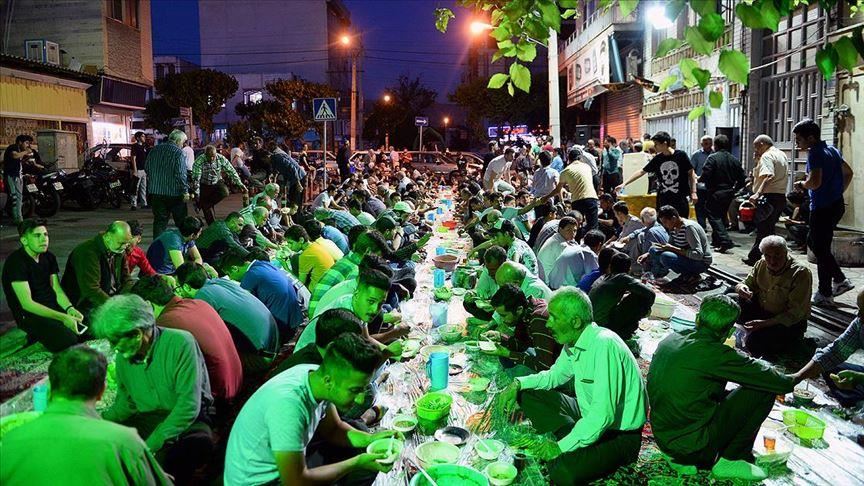OPINION - Criminalizing Ramadan: Illiberal tendencies in Western democracies
For the new generation being targeted, being Muslim is becoming more and more of a challenge and an obstacle while liberal democracies are running the risk of losing their essential democratic features

SALZBURG
Ramadan has since long turned into a political object in Western politics. When Madeleine Albright first started to organize iftar (fast-breaking) dinners at the White House during the Clinton era, many Western governments in Europe started to follow her newly introduced tradition. Congratulating Muslims on the advent of Ramadan has become a political ritual for leaders of Western governments to show respect not only to the followers of the second largest religion in the world, but also to a growing and contested religious minority in their own lands.
At the same time, Ramadan has also become a disputed issue. With the rise of right-wing identity politics throughout the West, right-wing and extremist opposition parties have identified the accommodation of the month of Ramadan in the discourse of the political elite as a good fodder for their anti-elitist attacks.
And more recently, the issue of Ramadan has also been problematized by politicians of centrist-right and left parties. About one week before the beginning of the month of Ramadan, Germany’s Family Minister Franziska Giffey from the Social Democratic Party (SPD) spoke out against what she referred to as strict Ramadan-rules for pupils. Immediately, anti-Muslim leaning newspapers gave her a platform to discuss the issue, also inviting health experts to advocate for young kids not to fast. She said: “Children need to drink and eat regularly, otherwise they cannot be attentive, learn and develop in a healthy way. This is generally the case and also true during Ramadan.”
Franziska Giffey, who is currently going through tough times because of allegations of plagiarism regarding her PhD dissertation that she wrote back in 2010, has had some experience regarding this issue. During her days as the mayor of a Berlin district, she implemented what was called “Die Neuköllner Empfehlung ‘Ramadan und Schule’ ”, a list of 12 recommendations on how to deal with Ramadan at school. The list was signed by a number of local mosques and does not represent a blatant anti-Muslim agenda. But it was also ambivalent, opening up space for interpretation that could harm religious freedom. One of the most questionable recommendations is that fasting was hard work for young people and for whoever is working, and there are religiously justified exemptions from fasting. While Giffey’s list of recommendations was still rhetorically cooperative in regards to the Muslim community, Hessen’s Minister of Justice Eva Kühne-Hörmann from the Christian Democratic Union (CDU) went even further.
In the first week of Ramadan, she proclaimed that parents who force their young kids to fast during Ramadan should be fined, arguing they would thus be harming their kids’ health: “I am in favor of holding responsible those parents who bring up their children in a fundamentalist way and of their standing trial.” Indeed, it is not the first attempt of a nominally centrist-right politician to attempt to regulate the Muslim practice of fasting during the month of Ramadan, which is one of the five pillars of Islam. For some time now, some Germans are looking to their southern neighbor Austria, where the Christian-conservative People’s Party (ÖVP) formed a coalition government with the right-wing Freedom Party of Austria (FPÖ) and is implementing one anti-Muslim legislation after another. The ÖVP’s general secretary and spokesman on integration came up with the idea of imposing a blanket ban on fasting in Ramadan for pupils during school time. Trying to ward off criticisms that what he was saying amounted to the violation of the freedom of religion, he argued that this would be best for their health. Fortunately, the party did not follow up on his idea. But it was introduced and became seeded in the minds of people where it will be working its way. Following the example of the ÖVP, later in 2018, Inger Støjberg, the Danish minister for Immigration and Integration, published a blog post claiming that the Danish population was at risk when the Muslim minority was fasting during Ramadan.
While all the examples given are in the context of liberal democracies, we remember the indignation that went along the global media coverage of the Chinese government’s criminalization of any expression of Muslim religious identity, including fasting during Ramadan. In China, at the heart of the government’s campaign lies the desire to erase any sign of Islamic religious identity in the Communist People’s Republic.
But while China is an authoritarian state, what about the examples given above from liberal democracies? Are politicians on their way to questioning the essential pillars of liberal democracy itself? Such attempts at banning one of the five pillars of Islam for the young and youth and thus an essential practice of Muslim life demonstrate that anti-Muslim policy recommendations can be easily argued at the backdrop of a hegemonic anti-Muslim discourse. For the new generation being targeted, being Muslim is becoming more and more of a challenge and an obstacle while liberal democracies are running the risk of losing their essential democratic features.
[Farid Hafez is a senior research scholar at the Bridge Initiative at Georgetown University and a senior researcher at Salzburg University.]
* Opinions expressed in this article are the author’s own and do not necessarily reflect the editorial policy of Anadolu Agency. Anadolu Agency website contains only a portion of the news stories offered to subscribers in the AA News Broadcasting System (HAS), and in summarized form. Please contact us for subscription options.



